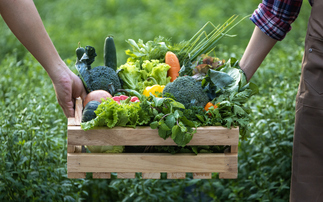Meeting SDG2 is about more than just ramping up food production, says the Soil Association's Sarah Compson
Support for organic and other agroecological approaches to farming lies at the heart of some of the solutions to the second Sustainable Development Goal to 'end hunger, achieve food security and improved nutrition and promote sustainable agriculture'.
While the causes and solutions to the issues addressed by the Goal are complex and multifaceted, major global institutions, including the UN, have endorsed the role that organic can play; "research shows that organic agriculture is a good option for food security... and [is] more sustainable in the long term".
Addressing the causes of food insecurity requires a more thoughtful approach than simply focusing on intensification of production; we already know that there are enough calories produced globally to feed nine billion. If we are to feed the world the barriers to address are political and structural, not agricultural.
So, how can organic farming help to address food security? It can do so both directly and indirectly. Organic is about more than farming without pesticides or artificial fertilisers. Organic takes a systems-based approach, working with rather than against nature. This involves optimising the use of natural resources and relying on holistic methods like crop-rotation, composting and growing nitrogen-fixing crops to build soil fertility and create a system that can increase yields and is more resilient in the face of climate change.
Crop rotation - a method which involves growing different crops in succession to sustain soil health - means that farmers also produce a range of crops that can help diversify their income and provide an important source of nutrition. This is a very direct way in which organic farming can help alleviate food insecurity, and its benefits are globally recognised.
While food security is an inherent benefit of the organic approach at the farm level, organic farming also has a broader, global contribution to make in the fight against hunger and food security, by helping to mitigate climate change.
Climate change - extreme weather events and prolonged periods of drought and floods - is exacerbating food insecurity. In fact, the UN's Food and Agricultural Organisation stated in their 2018 report on the state of food security and nutrition in the world that, "the cumulative effect of changes in climate is undermining all dimensions of food security - food availability, access, utilization and stability."
Despite the lower greenhouse gas emissions per hectare from organic farming, the assumption is sometimes made that lower yields will force an increase in overall land needed and thereby drive greater climate impact from deforestation. This assumption fails to take into account the imperative of dietary change to reverse the global obesity and diabetes crisis - healthier diets would reduce the land requirement for livestock and cereals. The ‘Ten Years for Agroecology in Europe' study modelled the impact of transitioning all European farmland to organic, and found that this could both feed Europeans a healthy diet and maintain export capacity while cutting agricultural greenhouse gas emissions by 40 per cent. For smallholder agriculture in developing countries, adoption of organic and agroecological systems tends to increase yield due to soil organic matter restoration and drought resilience.
Agriculture is the third biggest emitter of greenhouse gas emissions after energy and transport. This is partly due to conventional agriculture's reliance on high levels of artificial nitrogen fertiliser which drives nitrous oxide emissions and is highly energy-intensive to produce. As the recent UN Report on the Right to Food put it; "food systems are not only at great risk from climate change… they also are a major contributor to the emissions of greenhouse gases that are responsible for such changes. This is one major reason why a shift to agroecological modes of production is urgently called for."
It isn't just farming and food businesses that can have a positive impact on global hunger. Fashion and textile businesses can play a huge role in tackling issues of food insecurity and hunger by sourcing organic cotton. Some 98 per cent of those suffering chronic hunger live in developing countries, which are also home to 99 per cent of the world's cotton farmers. Crop rotation helps provide a source of food and additional income and helps to address the four dimensions of food security identified by the FAO; availability, stability, access and utilisation.
Numerous peer reviewed studies have shown that organic cotton can also help in the broader fight against climate change too. One life cycle analysis (LCA) addressing cotton production indicated that organic cotton has 46 per cent reduced global warming potential compared to conventional cotton.
Also, hunger, malnutrition and food insecurity are issues in developed counties too, including the UK. A report from the Food Foundation in 2017 found that only eight per cent of UK children aged 11-18 are eating five portions of fruit and vegetables a day. By supporting UK grown agroecological and organic horticulture, fresh produce could become more accessible.
Supporting organic and agroecological methods of production and including organic produce in procurement strategies is an empowering and straightforward way that businesses can contribute towards the SDG goal of ending hunger and food insecurity worldwide. Businesses can be confident that they are supporting a method of production that not only makes a positive contribution in the fight against climate change but enables farmers to feed themselves. There is good evidence to back these claims up, which gives businesses an opportunity to tell the story to their customers. This helps to raise awareness of the SDGs and provides a way for ordinary citizens and consumers to engage with and contribute to achieving these ambitious goals.






